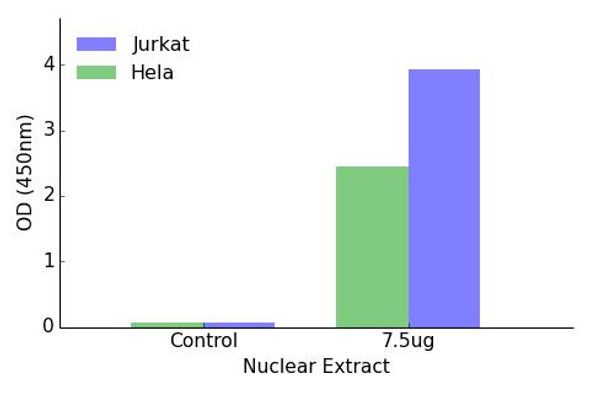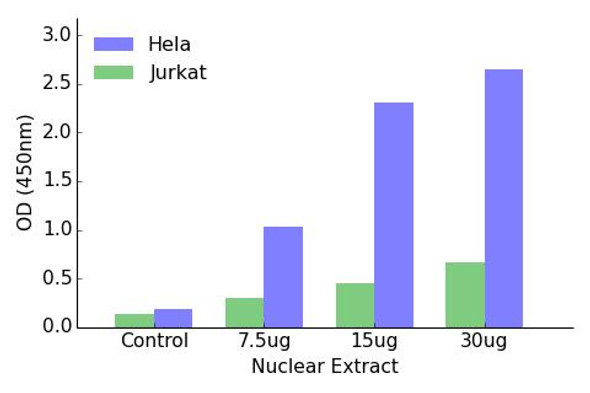Description
NFAT3 Transcription Factor Activity Assay
The NFAT3 Transcription Factor Activity Assay Kit is a powerful tool for measuring the activity of NFAT3, a key transcription factor involved in regulating gene expression in response to various signals. This kit is designed to provide accurate and reliable quantification of NFAT3 activity in cell lysates, serum, or tissue samples.NFAT3 plays a critical role in diverse biological processes, including immune response, cell differentiation, and development.
Dysregulation of NFAT3 activity has been implicated in various diseases, making it a valuable target for research and drug development.With its high sensitivity and specificity, the NFAT3 Transcription Factor Activity Assay Kit offers researchers a precise and efficient way to study the role of NFAT3 in health and disease. It is an essential tool for advancing our understanding of NFAT3 signaling pathways and identifying potential therapeutic targets.
| Product Name: | NFAT3 Transcription Factor Activity Assay |
| Product Code: | TFAB00183 |
| Target: | NFAT3 |
| Reactivity: | Human, Mouse |
| Sample Types: | Nuclear or cell lysates |
The Assay Genie NFAT3 transcription factor activity assay allows for the detection and qualitative analysis of endogenous levels of activated transcription factors in a variety of nuclear and cell lysates
Assay Genie ELISA kits are designed to significantly reduce experiment time and ensure sensitivity and flexibility for high-throughput screening.
| Assay Time: | 4.5 hours |
| Detection Method: | Colorimetric 450 nm |
| Size: | 12 x 8-Well Microstrips |
| Storage: | 4°C for 6 months |
| UniProt Protein Function: | NFAT3: a transcription factor that plays a role in the inducible expression of cytokine genes in T cells, especially in the induction of the IL-2 and IL-4. Also control gene expression in embryonic cardiac cells. Could regulate not only the activation and proliferation but also the differentiation and programmed death of lymphoid and nonlymphoid cells. Highly expressed in placenta, lung, kidney, testis and ovary. Weakly expressed in spleen and thymus. Not expressed in peripheral blood lymphocytes. 23 alternatively spliced isoforms of the human protein hve been reported. |
| UniProt Protein Details: | Protein type:Transcription factor; DNA-binding Chromosomal Location of Human Ortholog: 14q11.2 Cellular Component: cytoplasm; cytosol; intermediate filament cytoskeleton; nucleus; transcription factor complex Molecular Function:peroxisome proliferator activated receptor binding; protein binding; transcription coactivator activity; transcription factor binding Biological Process: calcineurin-NFAT signaling pathway; cellular respiration; DNA damage response, signal transduction resulting in induction of apoptosis; heart development; inflammatory response; muscle cell development; negative regulation of dendrite morphogenesis; negative regulation of transcription from RNA polymerase II promoter; patterning of blood vessels; positive regulation of transcription from RNA polymerase II promoter; positive regulation of tumor necrosis factor production; regulation of synaptic plasticity; smooth muscle cell differentiation; transcription from RNA polymerase II promoter |
| NCBI Summary: | This gene encodes a member of the nuclear factor of activated T cells (NFAT) protein family. The encoded protein is part of a DNA-binding transcription complex. This complex consists of at least two components: a preexisting cytosolic component that translocates to the nucleus upon T cell receptor stimulation and an inducible nuclear component. NFAT proteins are activated by the calmodulin-dependent phosphatase, calcineurin. The encoded protein plays a role in the inducible expression of cytokine genes in T cells, especially in the induction of interleukin-2 and interleukin-4. Alternative splicing results in multiple transcript variants. [provided by RefSeq, Jan 2014] |
| UniProt Code: | Q14934 |
| NCBI GenInfo Identifier: | 215274090 |
| NCBI Gene ID: | 4776 |
| NCBI Accession: | Q14934.2 |
| UniProt Secondary Accession: | Q14934,B4DDG5, B4DY55, B5B2U7, B5B2U8, B5B2U9, B5B2V0 B5B2V1, B5B2V2, B5B2V3, B5B2V4, B5B2V5, |
| UniProt Related Accession: | Q14934 |
| Molecular Weight: | 8,950 Da |
| NCBI Full Name: | Nuclear factor of activated T-cells, cytoplasmic 4 |
| NCBI Synonym Full Names: | nuclear factor of activated T-cells 4 |
| NCBI Official Symbol: | NFATC4 |
| NCBI Official Synonym Symbols: | NFAT3; NF-AT3; NF-ATC4 |
| NCBI Protein Information: | nuclear factor of activated T-cells, cytoplasmic 4 |
| UniProt Protein Name: | Nuclear factor of activated T-cells, cytoplasmic 4 |
| UniProt Synonym Protein Names: | T-cell transcription factor NFAT3; NF-AT3 |
| Protein Family: | Nuclear factor of activated T-cells |
| UniProt Gene Name: | NFATC4 |
| UniProt Entry Name: | NFAC4_HUMAN |






